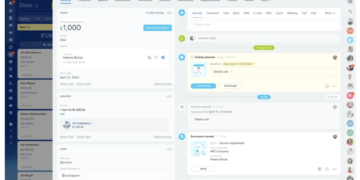The global Design Collaboration Software Market is forecast to grow from USD 3.8 billion in 2025 to a staggering USD 15.1 billion by 2035, expanding at a robust CAGR of 14.8%, according to new industry analysis by Future Market Insights. This surge is propelled by the widespread adoption of hybrid work models, cross-functional team structures, and a heightened need for remote ideation and co-creation across industries.
On-Premise Solutions Dominate with 46.3% Market Share, Yet Cloud-Based Platforms Lead in Growth
In 2025, on-premise design collaboration software will command the largest share (46.3%) of the market, driven by enterprise trust in data security and internal control. However, cloud-based solutions are anticipated to grow at a higher CAGR of 15.3% over the forecast period. These platforms enable remote accessibility, real-time edits, and integrations with workplace tools, offering unmatched flexibility for distributed teams.
Exhaustive Market Report: A Complete Study
https://www.futuremarketinsights.com/reports/design-collaboration-software-market
Services Industry Takes the Lead While Public Sector Gains Momentum
By industry, the services segment tops the charts with 26.4% of the market in 2025. The growing complexity of services delivery and increasing departmental interdependence necessitate agile collaboration tools to streamline operations and enhance performance.
Meanwhile, the public sector is expected to grow at the fastest CAGR of 15.4% as government organizations embrace digital transformation and upskilling programs. Design collaboration tools are enabling smoother transitions to digital public service infrastructure and employee training initiatives.
United States, Germany, and Japan Lead the Way in Adoption
The United States holds a 22.8% share of the market and continues to drive innovation, thanks to the deep-rooted culture of hybrid work, robust startup ecosystems, and increased investment in team productivity platforms. The country is expected to grow at a CAGR of 9.8% through 2035.
Germany, with a CAGR of 15.1% and a market share of 13.2%, is the fastest-growing country in the global design collaboration software market. The growth is fueled by the proliferation of automated manufacturing systems, a tech-savvy workforce, and the expanding footprint of remote engineering and design teams.
Japan is another critical growth engine, with a market share of 9.1% and a CAGR of 13.6%. The country’s emphasis on precision-driven design, lean development cycles, and collaborative innovation places design software at the heart of its corporate workflows.
India and China: Rising Giants in Collaboration Software Adoption
India is forecast to grow at a CAGR of 13.4%, with a market share of 11.4%. As India’s IT and services sector booms, demand for cost-effective, scalable, and user-friendly collaboration platforms continues to soar.
China, although slightly slower with a CAGR of 8.8%, still commands a significant 10.8% share. Rapid manufacturing digitalization and corporate modernization initiatives are laying the foundation for strong long-term growth.
Key Drivers Fueling Market Growth
Hybrid & Remote Work Normalization: Enterprises across industries are embracing collaborative platforms to enhance communication, streamline decision-making, and boost creative alignment across geographies.
Design-to-Delivery Integration: Companies are leveraging software that connects UX/UI, product engineering, and supply chain teams, thereby accelerating time-to-market.
Increased Automation & AI Integration: Intelligent platforms offering real-time editing, version tracking, and AI-enhanced ideation are becoming essential for agile design teams.
Demand from SMBs: Small and medium enterprises are turning to these platforms for cost efficiency, ease of use, and centralized collaboration to manage growing remote workforces.
Challenges Hindering Growth
Despite the favorable outlook, several challenges remain:
High Initial Costs: Many SMEs face hurdles due to implementation and training costs, especially for advanced platforms.
Skill Gaps: Untrained teams can face efficiency issues and miscommunication, impacting overall productivity.
Post-Pandemic Normalization: Some organizations reverting to in-person operations are reducing platform usage, affecting short-term growth in specific markets.
Recent Strategic Developments in the Market
Global tech companies are doubling down on collaboration tools as a long-term necessity, not a stop-gap:
Adobe has launched a fully integrated design collaboration platform enabling cross-functional design teams to co-create, share feedback, and deliver faster.
IBM introduced Remote Collaboration Suite, integrating with apps like Slack and Zoom to enhance virtual team building and productivity.
Microsoft, Google, Slack, and Zoom continue to expand features for project tracking, whiteboarding, and real-time co-authoring in their collaboration suites.
Get Ahead with Our Report: Request Your Sample Now!
https://www.futuremarketinsights.com/reports/sample/rep-gb-15831
Explore more insights in our related industry reports.
Designer Sneaker Market
https://www.futuremarketinsights.com/reports/designer-sneaker-market
PCB Design Software Market
https://www.futuremarketinsights.com/reports/pcb-design-software-market
Drug Designing Tools Market
https://www.futuremarketinsights.com/reports/drug-designing-tools-market
Future Market Insights Inc.
Christiana Corporate, 200 Continental Drive,
Suite 401, Newark, Delaware – 19713, USA
T: +1-845-579-5705
For Sales Enquiries: sales@futuremarketinsights.com
Website: https://www.futuremarketinsights.com
Future Market Insights, Inc. (ESOMAR certified, recipient of the Stevie Award, and a member of the Greater New York Chamber of Commerce) offers profound insights into the driving factors that are boosting demand in the market. FMI stands as the leading global provider of market intelligence, advisory services, consulting, and events for the Packaging, Food and Beverage, Consumer Technology, Healthcare, Industrial, and Chemicals markets. With a vast team of 400 analysts worldwide, FMI provides global, regional, and local expertise on diverse domains and industry trends across more than 110 countries.
This release was published on openPR.













